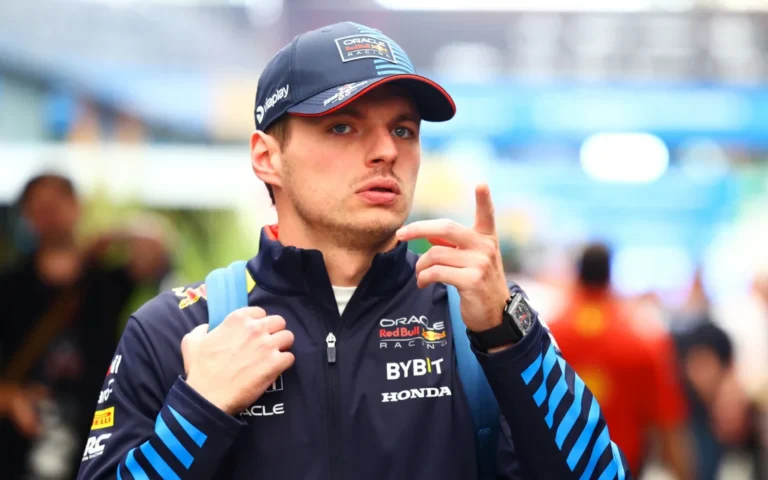In an exclusive revelation, Jos Verstappen, father and mentor to Formula 1 World Champion Max Verstappen, has opened up about the extreme and unconventional training methods he implemented to develop his son’s racing skills from a very young age. Among the most jaw-dropping insights is the disclosure that Max was encouraged to drive in heavy rain on slick tires — a rigorous, no-compromise approach that many in the motorsport world believe contributed to Max’s unparalleled skill in handling difficult conditions and his meteoric rise to F1 greatness.

Max Verstappen, who won his first Formula 1 World Championship at just 24 years old in 2021 and followed it up with a dominant 2022 season, is renowned for his exceptional control, decision-making, and raw speed on the racetrack, especially in wet weather conditions. His ability to extract performance from a car under challenging circumstances is considered one of the cornerstones of his success. But as his father Jos recently shared, much of this proficiency was cultivated in his early karting years, where training regimens pushed Max’s limits far beyond traditional boundaries.
Jos Verstappen, a former Formula 1 driver himself with an extensive career in motorsports, has always been intensely focused on preparing Max for the demands of top-tier racing. From a very young age, he recognized that Formula 1 is not simply about driving fast — it’s about adapting to ever-changing conditions, making split-second decisions, and consistently extracting the best performance in all circumstances. As Max’s primary coach, Jos made the unconventional decision to put his son through training that would expose him to the most challenging situations possible, honing his ability to remain composed and capable no matter what.
One of the most remarkable elements of Max’s early karting training was the inclusion of wet-weather sessions. Jos revealed that Max would often be required to drive in the rain, but the catch was that he would have to do so on slick tires, which are typically reserved for dry conditions. Slick tires provide less grip on wet surfaces, making them significantly more difficult to manage. This type of training, while brutal, forced Max to learn to anticipate changes in the car’s behavior, refine his steering inputs, and develop a sixth sense for car control.
Jos explained: “It was all about forcing Max to think ahead, to not just react to what was happening, but to anticipate it. In those early years, we put him on slick tires in the rain to make him fight the car and learn how to recover from every slide and loss of grip. It was about pushing him to his limits, making him uncomfortable, and teaching him how to stay calm and perform even when the conditions were extreme.”
While it may sound extreme, the logic behind Jos’s approach is grounded in decades of motorsport experience. Wet-weather driving in slick tires mimics a number of elements that are prevalent in racing, particularly in Formula 1, where changing weather conditions can make or break a race. By training Max in such difficult conditions early on, Jos aimed to ensure that when his son finally did reach the highest level of racing, he would be able to handle any track condition with ease.
In Formula 1, races are often decided by a driver’s ability to adapt quickly to fluctuating weather conditions. With rain affecting grip levels, tire choice becomes a pivotal element in determining success. Drivers who can excel in these conditions tend to stand out, as they can read the track, choose the right strategy, and make decisive moves when others may struggle.
Jos Verstappen’s training methods undoubtedly gave Max an edge when it came to driving in the rain. The level of focus and precision required to control a kart on slick tires in wet conditions is immense, and Max’s early exposure to this kind of challenge meant that when the situation arose in a professional race, he already had the experience necessary to excel.
Max’s exceptional wet-weather performances throughout his Formula 1 career offer the clearest testament to the success of his father’s training regimen. It’s no secret that Verstappen has often been at his best when conditions turn tricky. One of the most memorable moments of his early F1 career came in the 2016 Spanish Grand Prix, where Max won his first race at just 18 years old, overtaking world-class drivers with confidence and maturity that belied his youth. This victory was just a glimpse of the potential Max had shown as a karting prodigy.
In races like the 2021 Hungarian Grand Prix and the 2022 Brazilian Grand Prix, Max Verstappen’s ability to manage tire wear, adapt to wet and dry conditions, and make critical overtakes in the rain were pivotal in his success. His remarkable skills in the rain have since become one of the defining features of his racing identity, and Jos Verstappen’s intense training methods are widely considered to have contributed to this talent.
Moreover, Max’s rapid adaptability to changing conditions was apparent during several wet-weather races, where he could make tire decisions that others struggled with. The 2021 Belgian Grand Prix, which was delayed and eventually canceled due to heavy rain, saw Max leading the grid in the few laps that were raced under hazardous conditions. His poise and decision-making on slicks during the rain were lauded by commentators, with many acknowledging that it was a result of the foundation laid in his early karting days.
Jos Verstappen’s unconventional methods reflect a broader philosophy of driver development that is slowly becoming more recognized in motorsport. Traditional training focuses primarily on lap times and raw speed, but Jos took a more holistic approach, emphasizing the development of Max’s mind as much as his physical ability behind the wheel. In the world of professional motorsport, psychological fortitude, mental resilience, and the ability to make clear-headed decisions under pressure are as important as driving skill. Jos Verstappen’s teaching methods undoubtedly played a large role in Max’s ability to thrive under immense pressure and make decisions that would ultimately elevate him to the top of the sport.
It is evident that Jos Verstappen’s dedication and his unique approach to driver training were essential in shaping Max into the dominant force he is today. By taking unconventional paths, such as driving in the rain on slick tires, Jos prepared Max to face not just the obvious challenges of racing, but also the unexpected, difficult, and unpredictable situations that define the essence of motorsport.
As Max Verstappen continues to break records and dominate the world of Formula 1, the significance of his early training remains clear. The foundations built by Jos Verstappen — from mastering wet conditions to teaching Max how to remain calm in the face of adversity — have contributed to a career that has already seen the young driver become one of the best in the history of the sport.
Max’s continued success is not merely a result of his natural talent, but also of the extreme, pioneering methods his father introduced early on in his career. Through wet-weather training on slick tires, Max was able to perfect the skills that now allow him to tackle any challenge — be it wet, dry, or something in between.
As Formula 1 enters a new era of competitiveness and unpredictability, Max Verstappen’s journey, and the story of his exceptional preparation, stand as a testament to the power of thinking outside the box, pushing boundaries, and preparing for every scenario on and off the track. It’s a legacy of resilience, preparedness, and, ultimately, unmatched race readiness.






